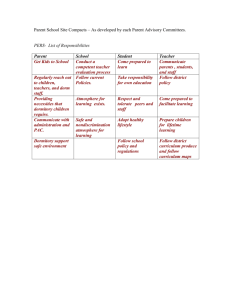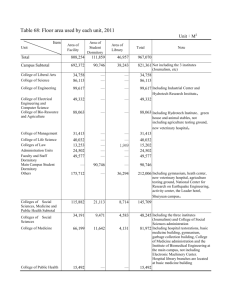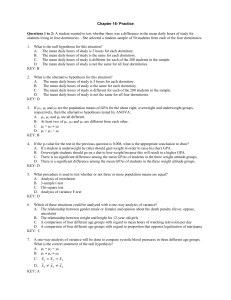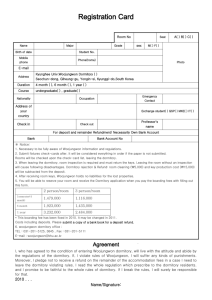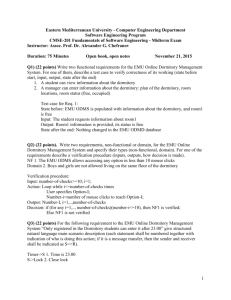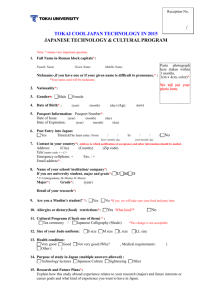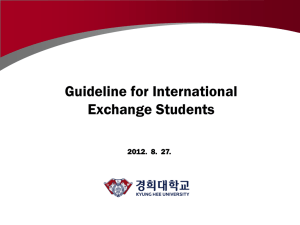Document 11938937
advertisement
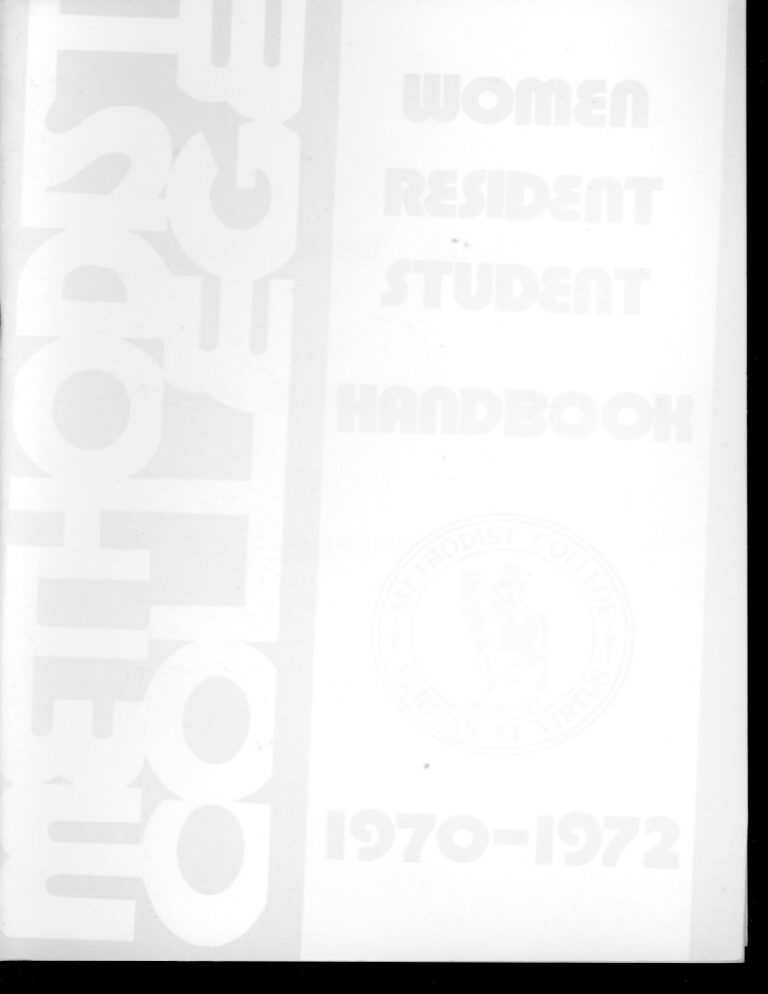
METHODIST
WOMEN
COLLEGE
RESIDENT
HANDBOOK
1970 -1972
STUDENTS
•
CONTENTS
House Directories
1970-71
House Directors
Student
Officers
Hall Counselors
Telephones
House Directories
1971-72 __
Student Government
Elections
Judicial
System
Dues
Curfew
Closed Study
Quiet Hours
Male Visitors
Sign-Out
Lates
Weekend or Overnight
Corning in Late
Vacation Sign-Out
Dress
Use of Windows
n
__
nu
__
nn_nnn_n_n_nnn_n_n
n
nnn
n
nn_nu_nn
__
nn
nu_nn_u
u
__
u
nn_nnn_nn
__
n_u
nnnn
__
nu
__
n
u
nn
__
nn
nn
n
nnn_n
u
n_nn
__
__
nnu
__
n_nn
_n
n
n
n
u_u_unnnn_nn
__
nn
n
n
n_u_nnn
n
n_nunn
__
n
un_n_n_n
__
__
n_u
n
n_n
n_n_nn_n_n_unnn
nn_unn
_u
n
__
n
nn_u
__
n_nn_nunnunn
Dining FraIl
Office Duty
Telephone
Calls
College Administrative
Policies __
Absent Policy
Academic Requirements
__
Fire Precautions
Medical Services
Womack Army Frospital __
Security
Electrical
Equipment
Cars
College Property Care
Linen Rental Service
Laundry Facilities & Kitchen Privileges
Pets
__
u
.
_n_hn_n_nn
_n_Un
••
u_n_n_n_unnn
hu_n_n_nnn
u
nnnnn
nn_
__
nn
_n
unu_n
n
nn
u_n_u_uun
__
__
nnh_
n
u_n_nnn
n
n_
__
n
nn_nnn
nu_nn_n
__
n
__
n_n_nnn
uu
u_nnn
u
n_
nn
__
._u_
3
3
3
3
4
5
5
6
7
8
8
9
9
10
11
11
12
12
12
13
13
14
15
16
17
18
19
21
22
22
23
23
24
24
25
25
r.llP~t~
?6
Storage
26
When a coed comes to Methodist College she is usually a girl who
has just graduated
from high schooL Will she become a Methodist
College woman? Her interest
in academic work and campus activities
will determine
this for her_ The M. C. coed is seeking maturity,
knowledge. understanding,
and a place in the world. Just when she ceases
to bc a girl and becomes a woman is hard to say. There are many
factors that will help her make this change. She benefits
from and
gives to those around her; she sets realistic and meaningful
standards
for herself.
She piles up achievements
along with occasional
failure,
but she learns from both experiences.
Living in a residence
hall can be one of the most rewarding
experiences at M. C. There are two women's residence
halls on campus.
r.etting
to know the students
in your hall and learning
to live with
them j~ an education
in itself_ Leadership
experience
is available
through serving 0n your House Council. Dorm life is valuable because
it stimulates
growth of character
and personality;
it develops attitudes,
interests, and abilities.
The Joint House C"lIncils of Garber and Weaver Fralls have compiled this guidebook so that you will understand
the rules and standards
by which Methodist College women live. By reading its contents
and
putting them to use you, too, with interest and spirit, can become all
M. C. woman.
Georgena
1968
1
'70
Jan Marcy,
'69
Linda
'69
Glenda
Fall
Clayton.
Perryman,
Stonbraker,
'70
•
FOREWORD
WELCOME
TO THE WOMEN'S
METHODIST
RESIDENCE
HOUSE DIRECTORIES
HALLS OF
COLLEGE
This Handbook has been created for reading by incoming students,
returning students, parents and guests. It contains a guide to residence
hall living through our regulations.
Weaver
House Directors:
Student
u
Mrs. Huldah B. Jones
__
We hope that you will quickly become familiar with the handbook
and share it with your family.
Best Wishe.s in the coming year,
The Dean of Women's Office
Garber Hall
Mrs. Mildred B. Stanton
Officers:
President
Jan Miller
Vice President
Linda Connolly
Susan Garrick
Secretary __
u
Kay Corbin
Treasurer
Social Chairman
Janis Daddario
House Manager ---- --------- ---- -Fire Captain
Judicial Board:
Pam Teer (Chairman)
Members:
Lynn Evans
Diane Scoggins
Terry Self
Mary Beth McKnight
Alternate
Liz Barnhart
Jo Anna Walker
Secretary
Prosecutin~ Attorney -.-------.
n
Initially, the regulations and comments may seem a bit overwhelming, but the reader should remember that through day to day living
they become a habit. The Residence Director, Hall Counselors, House
Officers, Dean of Women, Dean of Men, and the Dean of Students
are here to help you to make this a comfortable, happy year of resident
living.
1910/11
Hall
nn
u
_nO
__
n
u
__
Rosalind Thompson
Debbie Pender
Suzanne Warga
Debbie Bright
Candice Byrnes
u_
n
n_n
__
Susan Brown (Chr.)
Ada Andrews
Susan Thorne
Mary Jepsen
Barbara Hicks
n_
Hall Counselors:
1st floor east
1st floor west
2nd floor east
2nd floor west
3rd floor east
3rd floor west
nn_
n
n_n
n
n
_00
nn_n_n
Telephones:
Betty Lou Burns
Pat Walker
Lynn Gruber
Mary Alice Leimone
Valera Snider
Jane Stroud
Terry Self (Alt.)
__
nnn
__
n
__
__
n
(Area Code 919)
House Director's Apt.
Dormitory Office
1st floor pay phones
2nd floor pay phones
3rd floor pay phones
Dean of Women's Office
n
n_n
~
\0
LiJAl)/
~/
_n
n
__
noon
__
488-7612
488-6301
488·9834
488-9842
488·9895
488-7110 ext.
3
2
Ada Andrews
Donna Cook
Peggy Brown
Debbie Bright
Candy Byrnes
Susan Thorne
488-7575
488-0020
488-9892
488-9995
488-9867
237
STUDENT GOVERNMENT IN THE DORMITORY
HOUSE DIRECTORIES 1971/72
Weaver
House Directors:
Student
Hall
Garber Hall
__ n
Officers:
President
n_n_
Vice President u
•
Secretary
,
Treasurer
_
Social Chairman
.
House Manager __
Fire Captain
Judicial Board:
Members:
The women's dormitories have no constitution; tradition has set
most of the policies and practices. Changes in the rules and regulations
are worked out by the Joint House' Councils, with final approval by
the residents of the dormitories.
The House Council of each dormitory consists of the President,
Vice President, Secretary, Treasurer, Social Chairman, Judicial Board.
Chairman and Members, Prosecuting Attorney, House Manager, Fire
Captain, and all Hall Counselors. All members of the House Council
have votes.
Elections
and Appointments
h
_n
__
Alternate
n
u
__
Secretary
Prosecutin~ Attorney
_h
__
--The President, Vice President, Secretary, Treasurer, and Social
Chairman are elected in the Spring for the following school year.
-The House Manager and Fire Captain, since they may be freshmen, are elected in the Fall, shortly after classes start.
-The Judicial Board Chairman and Secretary are appointed in the
the Spring, as decided by the respective House Council.
Council.
-Four Judicial Board Members are either elected or appointed in
the Spring, as decide by the respective House Council.
-The Alternate, since she may be a freshman, is elected or appointed in the Fall.
-The Prosecuting Attorney is appointed by the SGA Attorney
General.
-The Hall Counselors receive a college stipend and are appointed
by the Dean of Women.
n
n
_
Hall Counselors:
1st floor east
1st floor west
2nd floor east
2nd floor west
3rd floor east
3rd floor west
n
Telephones:
1
n
n
_
_
Election
_
_
(Area Code 919)
House Director's Apt. _n
Dormitory Office _n_n
1st floor pay phones _n
2nd floor pay phones
3rd floor pay phones
Dean of Women's Office
U
_n
488-7612
n_ 488-6301
_
__
__
h
488-7575
488-0020
_
n
_
488-7nO ext. 237
4
Procedure
A Nominations Committee of 5 members shall be formed. The
President shall appoint 4 members who have no connection whatsoever with the House Council to the Nominations Committee and,
herself a member, preside over it.
This Committee shall collect names of nominees for the various
elective dormitory offices. So that all dormitory residents may
have equal opportunity to submit names for nomination, the
Nominations Committee shall give notice to the dormitory one (1)
week prior to its meeting that candidates are to be selected. The
Committee shall meet one week prior to elections, and the list of
nominees shall be posted 3 days in advance.
The election shall take place on the last Monday in April. A
simple majority shall constitute election. If there is a tie, a runoff will take place the same night.
The newly-elected officers will take office the first Monday in
May.
Candidates for any office as well as for Hall Counselor must be
rising sophomores or higher and must meet their academic class
requirements as outlined in the college catalogue (and copied here
on page 18). Exceptions: Candidates for House Manager, Fire
Captain, and Judicial Board Alternate if these offices are filled
with freshmen.
An office vacated at the end of a semester shall be filled within
2 weeks after semester break. The same procedures shall be followed which govern the spring elections. (This likewise applies to the
election of Fire Captain and House Manager if and when they
come up for election.)
Judicial System
Dormitory Judicial
Boards
Each dormitory has ;3 Judicial Board which tries all offenses against
dormitory rules. Offenses which may result in suspension or dismissal
from college are referred to the SGA High Court.
The Judicial Boar9 consists of 5 members with one appointed Chairman; one Alternate member who attends all meetings but votes only
when taking the place of an absent regular member; and the Prosecuting Attorney who is a member on the staff of the SGA Attorney General.
Each student has certain judicial rights that are standard in all
campus courts. Judicial Board meetings are open so that anyone may
attend, but may be closed on the request of either the dl'fendant or
the Board. Summons must be served on a defendant by the Prosecuting
Attorney 24 hours before her trail is due. A defendant may request
anyone on campus to serve as her defense attorney.
Standard penalties for "lates" have been adopted. A list of these
penalties is posted near the check-out board in each dorm. A student
charged with a "late" offense has the choice of either accepting the
standard penalty or asking for a Judicial Board trial. Ap.v student tritod
in the lower courts has a right to anpeal to the Inter-Dorm Court of
Appeals or go directly to the SGA High Court.
6
The Women's
Inter-Dorm
Court
of Appeals
The Inter-dorm court of appeals shall try all cases appealed to it
from the women's dormitories. The composition of this court shall be
six justices; three elected from each dormitory.
The house cOllncil and judicial board of each dorm shall compile a
list of nominees for that dorm; from this list the dormitory will elect
three justices. (This action is done separately between the two dorms:
Garhl'r will have a list compiled by their council and judicial board
and Weaver will have a list from Weaver.) Due to elections in the
spring, the old president and judicial board chairman shall serve in an
advisory capacity at the meeting for nominees.
Qualifications
for a Justice
are:
A 2.0 average; a class standing of no less than sophomore in the
fall. followin,g the spring elections. No justice shall serve on the house
judicial board and on the Inter-dorm court of appeals during the same
year.
After the court has been elected, the six justices shall choose among
themselves, a chief justice who shall preside at all meetings. All justices
shall vote, and a vl'rdict is rl'ached hv a simple majority.
When a case is appealed to this court. the court shall hold its
meeting in the dormitory of the girl involved.
Dues
An annual fee of $1.00 is due from each dormitory resident upon
checking into the dormitory at the beginning of the school year.
7
HOURS
student is not permitted to go into the dormitory lounge or to receive
calls (except from parents or long distance calls).
Second-semester freshmen whose Q.P. average is below the required
average, will be notified and will continue on closed study, with the
above exceptions. Closed study does not apply after the freshman
year, regardless of academic standing.
First-semester freshmen who enter Methodist College at the beginning of the second semester will observe closed study for one semester.
Closed study will be strictly enforced. It is suspended only (1) for
college-wide cultural and academic functions held on campus, and for
(2) Methodist College athletic events on and off campus. Freshmen who
do not attend these events are expected to observe closed study as usual.
Freshmen attending the events or going to the library have to
sign out giving their destination.
Curfew
Seniors
311:00
1
2:00
1:00
A.M
A.M.
Juniors
11:00
11:00
12:30
None
Freshmen
P.M
P.M.
P.M.
A.M.
11:00
P.M.
P.M.
O·
12:00
midnight
Sophomores
11:00
P.M.
(12:00 midnight)
Friday
Quiet Hours
Regardless of class, all students are expected to maintain reasonable quiet at the following times:
after
after
until 12:30
11:00
12:00A.M.
P.M.
noon
7:30-10:00
P.M.
Evening
Morning
after 11:00 P.M.
(Class standing is determined by a student's classification
Sunday
Friday-Saturday
Monday-Thursday
office of the Registrar.)
in the
When attending a college-sponsored event on campus which continues past her curfew, a student is expected to return to the dormitory within 15 minutes after the event ends.
Late permissions applying to all classes are occasionally issued
for special events on campus through the Dean of Women upon request
by the House Council. House Directors are authorized to grant individual
permission in special cases.
*Freshmen will be allowed 2 lates a month in order to attend
activities at the Cumberland County Memorial Auditorium. The student
is expected to return to the dormitory immediately afterward.
Closed Study
All first-semester freshmen will observe "closed study" hours in
their rooms, Monday-Thursday, 7:30-10:00 P.M. During these hours the
TV's, radios, and record players operated in the room after 11:00
P.M. (12:00 midnight on Friday and Saturday) must be kept low enough
to cause no disturbance for other rooms. The same rule applies to the
piano and TV in the lounge.
Male Visitors
The dormitory lounge is open to men:
Monday-Thursday
Friday
Saturday
Sunday
n_n
nn_._n
nn_nnn
n
nnn
nn
8
__
__
__
n
unnnnnun
un
__
nn_nnnn
12:00 noon--11'OO
12:00 noon-12:30
9:00 A.M.-12:30
9:00 A.M.-11:00
P.M.
A.M.
A.M.
P.M.
Men are allowed only in the lounge and the men's rest room.
Exception is made at the beginning and close of the school year, and
9
before and after vacation and semester breaks, to carry luggage to a
student's room. Permission must be secured from the House Director
at such times.
The only other exception being made is during Open-House observance when male visitors are permitted to go to their hostesses' rooms.
No man is allowed to remain in the lounge unless in the company
of, or calling for, a resident of the dormitory.
The men's dormitories, except for the House Directors' apartments
and the lobbies, are "off limits" to women students. Only during an
officially-announced Open-House observance may women students visit
the rooms.
SIGN-OUT
If a student leaves the dormitory after 7:30 P.M., or for an overnight or weekend, it is necessary to indicate that she is out of the
dormitory. This is done by turning her "sign-out" card up so that the
appropriate colored square can be seen. These cards are found in the
metal racks on the walls of the dormitory office. When a card has been
completely filled, the student should turn it in to the dormitory Secretary and receive another. It is the student's responsibility to obtain a
new card.
.
leaving
the Dorm after
7:30 P.M.
When a student leaves the dormitory after 7:30 P.M., she is required
to turn up her card so that the red square is showing. Filling out the
sign-out card is completely optional. If a student decides to do so, she
should fill in the card as shown below, giving all the information asked
for.
":..
Return
--
'" ._---Expected
>Relurn
Actual
--
DESTrNATJQNESCORT
uavlng
'.'>'
,.
Z
TIME
:M.
ttil:~
When the card is turned up, the student
is automatically signed-out until her curfew.
Taking
a late
When a student takes a late, she must
put the date in the appropriate column
and place a check in the "Late" column,
as shown in the previous example.
Signing
out During
the Day
The only condition under which a student is required to sign out before 7:30
P.M. is when she is leaving Faytltteville.
Sign-out
for Weekend
or Overnight
.
When leaving the dormitory for the weekend, each student is required to sign out
on the appropriate side of the card. She
places her card bact: in the rack with the
black square showing.
Again, giving detailed information, except for date and time, is completely optional. In the student's own interest, however, so that she can be quickly located in
an emergency, she should leavp all pertinent information in a sealed envelope with
her card or on her desk.
This same procedure is used when
An overnight refers to Sunday through
runs from Friday to curfew on Sunday;
out for Monday morning when taking a
signing out for an overnight.
Thursday night. A weekend
however, a student may sign
weekend.
Weekends and overnights are unlimited for sophomores, juniors and
seniors. Freshmen are exoected to stay on campus the first 2 weekends
as part of their orientation; they are then limited to 10 weekends or
overnights for the first semester. If a student soends only one night of
a weekend away from campus, this is still counted as one weekend.
10
11
Coming in Lat.
When, for any reason, a student finds it impossible to reach the
dormitory by her curfew time, she, in person, must call the House
Director before she is due, to give notice that she will be late. This
applies to both weekday and weekend absences from the dormitory.
Should a student not return to the dormitory within an hour following her expected time of return, and she has not reported to the office of
the House Director that she will be late, her parents will be notified.
Leaving
For Vacation
or The End of School
When a student leaves for a vacation period or at the end of the
school year, she is required to sign-out. At such times she is expected
to vacate the building no later than one hour after the official closing
of the college.
I
In academic
and administrative
buildings:
Women .must wear
dresses, skirts or dress-slacks and blouses, or pant-suits. Gym clothes
must be covered by a suitable garment. Shirt tails of man-type shirts
must be worn tucked in. T-shirts, shorts, sweat shirts, tight slacks, jeans,
and bare feet are not permitted.
In the Dining Hall: Casual clothes within the bounds of good taste
may be worn. In compliance with health regulations shoes must be
worn at all times, and students eating immediately after participating
in sports must shower before entering the Dining Hall and cover their
gym clothes with a coat.
Sunday noon meal and special occasions require dress clothes
and dress shoes.
In the Library: Daytime dress is the same as for other academic
buildings. After 5:00 P.M., slacks and bermudas which meet the standards of good taste are permitted.
USE OF WINDOWS
Talking or throwing objects out of or up to a dormitory window at
any time is strictly forbidden. No more than a brief message is permissihle.
Garments are not to be hung in the windows at any time.
Blinds must· be drawn when the lights are on in the room, or if
the occupants are not fully dressed.
Ledges outside of the windows are not to be used for cold storage.
On the second floor in the Laundry Room, a refrigerator is provided
for s1lch purposes.
No items of any nature, including decorations for campus events,
can be di~nlaved outside the window~ until cleared hy the officers in
charge with the Dean of Women's office.
The dress regulations are based on a belief that a student shows
respect for herself. and her college by the appearance she keeps both
on and off the campus. It is assumed that a Methodist College woman
will be neatly and suitably dressed at all times.
THE COLLEGE DINING HALL
Excf'pt for certain festive occasions. service in the dining hall of
the Student Union is cafeteria style. Failure to return one's tray of
dishes to the proper window before leaving the Cafeteria is deemed
a violation of an important college regulation.
Unopened cartons of milk are the only food which may be removed
from the Cafeteria to the dormitory. Silver, dishes, and trays are not
to be removed from the Cafeteria premises at any time.
Loud or conspicuous behavior is out of order at all times in the
dining hall. Stlldents who apnear in imoroner dres~ or deface the decorum
of the dining hall will be asked to leave the premises.
12
13
DRESS
••
OFFICE DUTY
Paid workers are in attendance in the dormitory office for most of
the time the lounge is open to visitors. The remaining time, if any, is
divided equally among all residents of the dormitory. Assignments for
such office duty are worked out by the dorm Secretary. Failure to appear
for assigned duty, or to arrange for a substitute in case of forced
absence, is considered one of the most serious infractions of dormitory
regulations and is subject to Judicial Board action.
During her on'duty time in the office a student assumes the role
of a receptionist representing the college to the public. As such, she is
expected to uphold in her own person certain standards of dress and
conduct and to enforce certain rules governing effective .operation of
the office ·itself.
Male visitors are absolutely forbidden from entering the
dormitory office, hence from 'using the office telephone or the
intercom system. This rule has become imperative in order to
safeguard information appearing on students' records in the
office.
Dress shall be neat at all times. Until closing of the dormitory, a dress (or skirt, slacks and blouse) is required. Shorts,
bermudas or pajamas with robe are permissible only on late
d11ty (after closing). House slippers and hair in curlers are
likewise permissible only on late duty.
No visitor, male or female, shall be allowed to announce
over the intercom.
Language used over the intercom must be dignified at all
times.
Discretion must be exercised in releasing information over
the telephone. Recommended:
"X is not in the dormitory just now. May I take a message?"
anyone, except parents, when inquiring whereabouts, "I'm
sorry, but I'm not permitted to give out that information.")
(To
Under no circumstances are names of dormitory residents to be
supplied to any person calling over the telephone or to anyone appearing in person in the lounge.
~
All outbound calls must be made over the pay telephones. There
are phones on each dormitory floor.
The dormitory office switchboard is reserved exclusively for incoming calls to students and emergency calls made onbehaIf of the dormitory. Any outgoing call over the office phone requires authorization
from the House Director or her delegated substitute. Under no circumstances can the office phone be used for any long distance
or otherwise.
lncoming
Calls
Inbound calls are received through the dormitory office switchboard,
then picked up by the student on an extension line. There is an extension phone on each dormitory floor. When a student receives a telephone
call in the office she is paged over the intercom. The switchboard will
not be in operation after closing hours; therefore, parents and friends
should have, in addition to the office phone number, the House Director's
phone number and individual floor pay phone numbers as listed on
page 3 of the handbook. When a student has been out of the dormitory
and returns, she should check the bulletin board beside the extension
phone on her floor for any messages which may have been left for her.
Because all of the phones are taxed to line capacity, a lO-minute
time ~imit on all local calls must be rigidly enforced.
15
14
calls, collect
•
ADMINISTRATIVE
Passed
By A Committee
POLICIES
Each student is expected to work for the best interest of Methodist
College, to represent the best thinking of the student body, to conform
to the regulations of the college, to strive to perpetuate the finest
traditions of the college, and to plan intelligently for improvement
and adjustment wherever needed.
ABSENT POLICY
Regular class attendance is a student obligation, and the student
is responsible for all the work, including tests, laboratories and written
work, of all class meetings. No right or privilege exists which permits
a student to be absent from any given number of class meetings.
Instructors will keep attendance records in all classes. If a student
misses three consecutive class meetings the instructor will make such
report to the Academic Dean. If a student has excessive absences to
the extent to whirh dismissal from the course appears to be the approoriate action, the instructor will make such recommendation to the
Acarlemic Dean and will so notify the student. The Dean will make the
final disposition.
Tn the event of a public reouest, college-sponsored activities or
family emergencv. the Dean of Students is ve~ted with authority to
p,<c"~e surh st11rlpnt or students involvpd and will repnrt such excuses
t" th" aonrnnriate instructor. Work missed because of these absences
I"I111St
be made up.
OF COLLEGE
Of The Board of Trustees,
May 1968
1. The administration of the college believes that participation in the
college will be helpful and valuable to the student government association. However, the following matters are reserved to the administration and faculty of the college, subject to approval of Board
of Trustees.
A. Academic matters
B. Operation of infirmary and health of the students
C Dormitory assignments
D. Food services on campus
E. Organization of student groups on campus
F. Control of all college property
G. Supervision with student rppresentatives
on committees, of
assembly program, chapel exercises, special events and speakers
2. The President of the college, the Dean of College, and the Dean of
Students reserve the right to handle special cases of discipline,
which in their judgment should be handled by the administration.
3. The administration of the college will consider the following possible
grounds for separati0n of the student from the college and reserves
the right to review decisions of the student courts involved in such
matters:
A. Conviciton of. a crime in court
B. Damage to college property that indicates vandalism
C. Stpaling or abuse of another's property or possessions
D. The use or possession of alroholic beverages on campus
E. Cheating in anv form in academic matters
F. Breach of social prohation
G. Participation in a riot or unlawful demonstration
H. Hazing in any manner
I.
Giving of fal~e idormation for excuse
J. Tlpnnering with fire alarm e011ipment on campus
K. Failure to fn]low general rules and regulations of college as
printed in publications
L The use or possession of drugs outlawed by State and Federal
Laws
M. Intprruption or interference with the normal program of the
college
N. Conduct that is derogatory to college community
16
STATEMENT
OF PROCEDURES
The attendance policy of each instructor as it applies to his various
classes is to be set forth in writing and distributf'd to c)as~ members
at the beginning of the semester. No policy shall provide for unlimited absences.
2. The instructor will report the total number of absences of each
student at the end of the semester, using grade sheets supplied by
the Registrar.
1.
3. When an instructor reports to the Academic Dean the continuous
absence of any student for a ppriod of one week or more, the
Academic Dean may rfOllest the office of the flean of Stlldf'nts to
investigate. If the investigation provides information of a significant
nature. the Academic Dean will advise the instructor.
4. The allthority vested in the office of the Dean of Students to excuse
students from classes in cases of public request, college-sponsored
aetivities or family emergencies may be d('l~gated by the Dean of
Students to his immediate subordinates, the Dean of Women and
the Dean of Men.
•
17
FIRE PRECAUTIONS
ACADEMIC REQUIREMENTS FOR CONTINUANCE
IN COLLEGE
All of the buildings at Methodist College are completely modern
in construction. The dormitories in particular are as fireproof as such
buildings can be made, but the contents of a dormitory make it vulnerable to fire. The regulations pertaining to fire have been formulated
with the objective of providing maximal protection for every student
in residence on the campus. It is policy and practice alike at the college
to treat every fire drill as an instance of real fire.
Full-time students are expected to make normal progress toward
graduation, which requires a cumulative average of 2.0 or better. A
student must maintain the academic record indicated below to be in
good standing in the college.
1.
A minimum cumulative grade-point-average of 1.25 at the end
of the spring semester of the first academic year.';-
2.
A minimum cumulative grade-point-average of 1.50 at the end
of the spring semester of the second academic year.
3.
A minimum cumulative grade-point-average of 1.75 at the end of
the spring semester of the third academic year.
4.
A minimum cumulative grade-poi nt-average of 2.00 at the end of
the spring semester of the fourth academic year, and thereafter.
5.
A full-time student who does not pass at least 16 semester hours
in two semesters of an academic year will be suspended.
Key persons in each dormitory are assigned special functions in
the fire safety program at the college. They are the House Director,
the Fire Captain, and members of the Fire Committee, known as Fire
Lieutenants. In the event of fire (or fire drill) they are authorized to
direct the alert and the evacuation procedures outlined below in conjunction with the Fayetteville Fire Department.
Infractions of fire drill procedures are disciplined by the respective
Judicial Boards of the dormitories. Tampering with dormitory fire
equipment (alarm systems, fire extinguishers, etc.) is considered a very
serious offense.
Alert
"College attendance in the first and/or
stitute an academic year.
the second semester will con-
Procedure
Any student who discovers smoke or fire should notify the nearest
Fire Lieutenant who is then responsible for turning in the alarm. There
are two methods of sounding the alarm. The standard one is via the
red fire alarm boxes. If this form of alarm is found to be out of order,
the Fire Lieutenant will ring a loud cow bell kept in reserve for such
an emergency. The Fire Deoartment will be called by the House Director over the nearest telephone. In the event of the House Director's
inraoadty. second in line of duty is (a) the Fire Captain or (b) her
d~si!tnab>d s1Jb~titute. The dorm Fire Captain will disoatch a member
of her Committee to meet the fire trucks as they' approach, to direct
them to the fire site and to any trapped students.
A student who does not maintain the required standard will be
given an academic warning. If he fails to raise his cumulative gradepoint-average to the next required standard by the end of the following
spring semester, he will be suspended.
A student may app"al his academic suspension to the Academic
Supervisory Council if he has encountered extenuating circumstances
during the academic year.
Evacua~ion
When you hear the alarm, grab coat (or blanket) and shoes if you
can. Do not attempt to save any possessions.
2.
Open your hall door slowly and cautiou~ly. Sniff for smoke in hallway; feel the door for heat. If fire is evident outside the door, close
the door and remain inside. Stand at your window and signal for help
19
18
-
Procedure
1.
••
from the ladder crew by holding a sheet or pillowcase out of the
window.
3. If the hallway appears clear, vacate the room at once, leaving door
open and lights on. (Exception: if fire is in your room, close door
on leaving in order to confine fire to that area.)
4. Go immediately to your Number 1 exit (see chart below). If you
find this blocked, go to the nearest possible fire exit. In the rare
event this, too, is blocked, return to your room and proceed as in
#2 above.
Procedure For Fire Committee
1. When you hear the alarm, grab coat or other outer covering and
shoes. (Or, if you are notified to Use the emergency cow bell, go
up and down YOur section clanging the bell.)
2.
Start a check of your assigned area. Look in each room to be Sure
no person is there: then turn off light and close door.
3. available
When all exit.
your rooms are checked, leave the bUilding by the nearest
4. If the fire site is in your area, take measures to contain it by closing
adjacent doors and using fire extinguisher, if indicated.
5. If you discover anyone overcome by smoke and gases, if conscious,
get to fresh air outside; if unconscious, apply artificial respiration.
First Floor
Second Floor
LOBBY
~ I Go Out Lobby
--
Go Out Lobby
11'l
MEDICAL
Provisions In Case Of "'ness
SERVICES
I&l
206
220
323
308
221
207
322
The cOllege Infirmary offers service when necessary on a 24-hour
basis. Otherwise, the Infirmary is open with nurse on hand to see
students Monday-Friday, 8:00 A.M.-5:00 P.M. When a nurse is needed
at times other
thanthetheHOUse
regularly
scheduled hours, the call must be
channeled
through
Director.
Dr. JOf1~eEquez, a Fayetteville physician on the staff of Cape Fear
Valley Hospital, holds daily clinic in the Infirmary, Monday-Friday,
8:00-9:00
He is on call through the Infirmary at other times in
case
of anA.M.
emergency.
307
Third Floor
Consideration for the health and welfare of all dormitory residents
necessitates the fOllowing restrictions on illness in the dormitory:
5.
Once outside the building, proceed quickly to the lounge of the
opposite dormitory. Go to the end of the lounge (east or west)
corresponding to the end of the hall on which you live in your
own dorm. Wait there for your Fire Lieutenant to check roll. Stand
with your roommate to facilitate roll call.
6. Listen for the "All Clear" signal from the Fire Captain before returning to your building.
•
Any student Claiming physical disability as grounds for missing classes must be confined
in the Infirmary if the absence
covers as much as a day (or two meals in the Cafeteria). The
persons.
dormitory is not considered a suitable place for housing sick
Excuses from classes for medical reasons must be obtained
from the Infirmary staff. The Infirmary nurses are not permitted
to issue excuses unless they have seen the student in the Infirmary
in advance
the not
absence.
(In other words, a telephone call to
the
Infirmaryof will
suffice.)
20
21
In the event a student is so seriously incapacitated as to be
unable to report to the Infirmary, the nurse may be called to
request a college vehicle to transport the student. In such event,
the House Director must authorize the call.
The Cafeteria is instructed to refuse food requested for a
student remaining in the dormitory unless the request is issued
directly by the Infirmary staff. Likewise, the House Director is
under instruction not to prepare or serve food to a student remaining in the dormitory for medical reasons.
Concerning
Womack
Army
Hospital
Fort Bragg, an Army installation located near Fayetteville, provides
military dependents with several services (as does nearby pope Air
Force Base). If a student dependent under 21 years of age elects to use
Womack Hospital facilities at the base, she must have written parental
pprmission on file for doctors to treat her; otherwise, the hospital must
call the parents long distance. A student dependent with no previous
medical record at Womack Hospital will be as1{ed, on her first visit,
to present her parental pprmission along with hpr military I. D. card,
as prerequisite to the establishment of a medical file at the hospital.
SECURITY
PROVISIONS
At the opening of school each dormitory stuilent is issupd a room
key. A $1 00 deposit is collected at time of issue. This is refundable upon
return of the key.
Each student is urgpd to keen her room locked at all times. The
college cannot be responsible for losses from rooms. suite·mates should
be urged to cooperate.
Between the hours of 7:00 P.M. and 7:00 A.M. the east and west
sir1e doors on the first floor of the dormitory are locked on the outside.
This is done for the protection
of the students
living
in the dormitory.
Any student opening these doors within this period via the emergency
bar inside, or using the door for entering or leaving the building, or
assisting others to do so, will be dealt with severely. The college is in
process of installing an alarm device on the first floor side doors. The
device will be connected to ring after 7:00 P.M. if anv one of these
doors is opened either from within or without the building.
•
22
Once the main doors of the dormitory are locked for the night,
they are not to be opened for late-returning students except by the
House Director, the student worker or dormitory officer in charge of
the office, or the college Security Officer on duty. Upon returning to
the dormitory for the night the student is expected not to leave again,
unless permission is granted by the House Director, before 7:00 A.M. the
following day.
A Security Officer is on daily duty at the women's dormitories from
7'00 P.M. to 7:00 A.M. His duties include checking the dormitory doors
to make sure they are securely locked after closing.
Students rooming on the first floor are asked to keep their windows
locked at night. The dormitories are air-conditioned for student comfort.
ELECTRICAL EQUIPMENT
The fire insurance coverage of the college determines what electrical
items can and cannot be used, and where, in the dormitory.
Irons
Fire policies in North Carolina forbid the use of irons in
college dormitory rooms. When not in use personal irons may
be stored in the rooms, but they must be carried to the Laundry
Room to be used.
Permissible
Items
rpfrigerator, table-top model, not to exceed 2.5 cu. ft.
radio
clock
heating pad
TV
desk lamp
coffee maker
record player
floor lamp
corn popper
Excluded
blanket
Items
hotplate or other cooking device
sun lamp
CARS
Freshmen and students on Academic Warning are not permitted
to kPpT)01' operate a car on campus.
Students who are elie-ihle to operate a car on campus have to
regi~ter it at the Comntroller's office for a fpe of ~5.00 per year prior
to the time the vehicle is operated on collegp propprty.
A temporarv stic1cer has to be purchased for 25c for any vehicle
operated more than 12 hrs. on campus.
23
I
CARE OF COLLEGE
PROPERTY
Each dormitory room contains built·in beds, wardrobes, desks with
bookshelves, and desk chairs. There is one large window. Rugs, drapes,
and lamps, as well as blankets, are furnished by the student. Bed linens
and towels are optional, depending on whether or not the student
contracts for weekly linen service through the college.
Since wall colors vary from room to room, roommates may find it
advisable to wait until arrival in Fayetteville to purchase spreads and
drapes. Bed and window measurements vary somewhat between the
two dormitories:
Garber Hall
76" x 33"
51" x 48"
Beds
Windows
Weaver Hall
76" x 35"
80" x 48"
Damage to any college properties, including dormitory rooms,
which is determined to be the fault of the student is charged against
the student in the Business Office. Settlement of all such debts is
req11ired before grades will be released at the end of a semester, or final
graduation approved. If at the first of school a student discovers damage
in her room, she should report it immediately to the House Director.
Housekeeping in dormitory rooms and bathrooms is the responsibility
of the occupants. Equipment for this purpose is provided by the college.
Inspection of rooms is the duty of the House Counselor on the floor,
and is done on a weekly basis. Rooms improperly cared for are reported
to the dormitory Secretary. The college is also subject to occasional
unannounced inspections by the Fayetteville Board of Health.
Use of nails, hooks, screws, and thumb tacks on walls or woodwork
)f the dormitory is strictly forbidden. Items may be hung instead with
adhesive picture hangers.
When regular repairs are called for they are reported to the House
Manager; in case of emergency repair, to the House Director.
LINEN RENTAL SERVICE 1970·71
The best interest of the students, parents, and the College can be
served through the rental of linen by the students. The company will
provide two sheets, three bath towels, and one pillow case per student
each week for $13.00 per semester plus $.52 tax; or $26.00 per academic
year plus $1.04 tax. The College Linen Fee may be paid in advance
directly to the Business Office or paid to the Business Office upon
arrival at the College for the fall term. WE HIGHLY RECOMMEND
24
THAT THE STUDENT PAY THIS FEE IN ADVANCE, SINCE HE
MUST PRESENT HIS RECEIPT AT THE LINEN ROOM IN THE DOR.
MITORY TO RECEIVE ANY LINEN.
Full-size Kapok-filled pillows are available, directly from the company, to those students who desire them. The cost for this item is $1.75
plus $.07 tax for a total of $1.82 and the pillow becomes the property
of the student. This service is entirely voluntary. Any student participating in this linen service for a period of two weeks and remaining
enrolled in the College is not eligible for any refund.
LAUNDRY
FACILITIES
Coin-operated washers (25c) and dryers (lOc) are provided in the
Laundry Rooms at the east and west ends of the second floor. of each
dormitory.
There are ironing boards in these rooms.
KITCHEN
FACILITIES
A refri,gerator is provided in a second-floor Laundry Room for the
use of students. Food and drinks must be clearly marked with the
owner's name. Each student will be held responsible for clearing out
her own items before they become stale. Each student will al~o be
expected to take her turn when assigned to defrosting the refrigerator.
The kitchen located off the main lounge is unlocked ff)r student
use each evening, Monday through Thursday, upon closing of the dormitory. Use of the kitchen at such times is under supervision of the
H01Jse Mana,ger, and each girl using it is required to sign on the form
providpd in the kitchen. Kitchen privileges extend only to the preparaticn of Iif!ht snacks; no meals, or large scale cooking or baking, ran be
permitted because of Board of Health restrictiom. No men are allowed
in clean
the kitchen.
it
and in Anv
order.student using the kitchen will be expected to leave
PETS
State and local Board of Hpalth regulations require the college to
excluG.:' from the dormitories all live pets with the exception of fish.
25
GUESTS
Every overnight guest in the dormitories must be registered by her
hostess with the House Director prior to arrival. The fee for each night's
stay is $1.00, payable to the House Director at the time of registration.
All guests must abide by the dormitory and campus regulations. It
will be the responsibility of the student hostess to advise her guest of
these regulations.
A male student who wishes to house a female guest in one of the
women's halls follows the above procedure. Likewise, a female student
who wishes to arrange for guest space in one of the men's halls will
call the House Director of either Cumberland or Sanford Hall in advance to make the necessary arrangements.
STORAGE
OF GOODS
The college maintains a locked trunk room in the basement of the
dormitory. Over the summer vacation students are allowed to store
reasonable amounts of personal belongings up to the limit of the storage
room capacity. Each student using storage space is asked to sign a statement releasing the college of responsibility in case of loss by fire, theft,
or otherwise, in accord ~ith the insurance provisions of the college.
26
